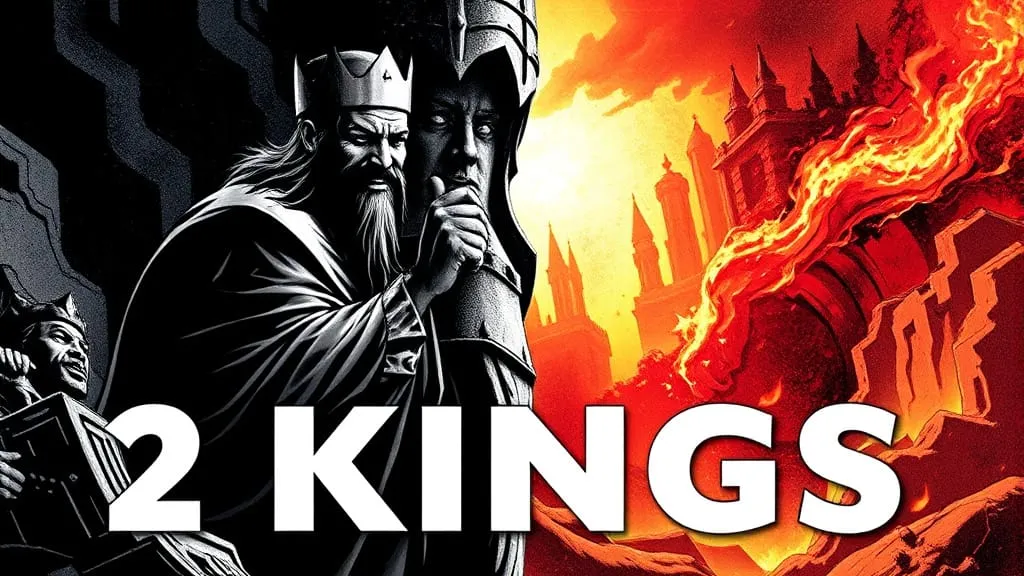Men read the Book of 2 Kings and they see a depressing historical record. They see it as a long, bloody, and ultimately futile chronicle of bad kings, political failure, and divine judgment. They are reading the terminal diagnosis of a patient and complaining that the story is sad. They have mistaken the symptom for the disease.

2 Kings is not a history of a nation's fall. It is the final, inevitable outcome of a soul that has rejected its internal King. It is the spiritual autopsy that reveals the consequences of the choice made in 1 Samuel. It is a detailed account of what spiritual gravity looks like: what goes up in pride must come down in ruins.
1. The Kings are Your Inner State
The endless succession of kings, almost all of whom "did evil in the eyes of the Lord," is not just a list of historical figures. It is a mirror of a consciousness ruled by a succession of egoic impulses. Each king represents a different ruling passion on the throne of your heart. One moment you are ruled by the ego of greed (Ahab), the next by the ego of pride, the next by the ego of fear. As long as a human ego, any ego, is on the throne, the outcome is always the same: spiritual corruption and death.
2. Naaman the Leper: The Ego Confronts Healing
The story of Naaman is the entire message of the book in miniature. Naaman is a great man, a military commander, powerful and respected. He is the successful ego. But he is a leper; he is spiritually unclean, corrupted from within.
He goes to the prophet of God, Elisha, expecting a grand, religious cure. He expects a performance, a magical incantation, something to satisfy his ego's sense of importance. What does he get? A simple, humiliating instruction from a servant: "Go, wash yourself seven times in the Jordan." (2 Kings 5:10).
Naaman's reaction is pure ego: "He went away angry." (2 Kings 5:12). He is insulted. The cure is too simple, too humbling. It doesn't acknowledge his greatness. Only when his servants convince him to let go of his pride and perform the simple act of surrender does healing come. This is the only path to healing for any soul: the death of the proud ego through a simple, humiliating act of faith.
3. The Failure of Religious Reform
The book highlights two "good" kings, Hezekiah and Josiah. They are archetypes of the religious ego's best attempt at self-reform. Josiah rediscovers the "Book of the Law," tears his robes, and initiates a nationwide religious reformation. He cleans house, smashes idols, and restores the Temple worship.
And what is the result? It doesn't last. As soon as he dies, the people revert to their old ways. Why? Because you cannot fix an internal problem with an external solution. Josiah changed the religion, but he could not change the consciousness of the people. Cleaning the outside of the cup does nothing if the inside remains full of filth. This is the final, definitive proof that even the most sincere religious reform is utterly powerless to save the soul.
4. The Destruction of the Temple: A Divine Mercy
The book culminates in the ultimate catastrophe: the destruction of Solomon's Temple and the exile of the people to Babylon. The religious mind sees this as a tragedy, a punishment from an angry God. This is blindness.
The destruction of the Temple was a profound act of divine mercy. The Temple had become the ultimate idol. It was the prison the ego had built for God. It was the physical embodiment of an external, man-made religion that allowed the people to believe they were right with God while their hearts were far from him.
The Temple had to be destroyed so that they could one day learn the truth that Jesus would later reveal: that the true temple is not made of stones, but is the human body and consciousness (John 2:21). The Exile to Babylon, the world of the ego, was the necessary consequence. They had to be fully immersed in the kingdom of the ego to finally understand the horror of the choice their ancestors had made when they first demanded a human king.
2 Kings is not a story of God's anger. It is the story of His terrible, loving adherence to spiritual law. It shows, in excruciating detail, the inevitable end of a consciousness that seeks its king anywhere but within. It is the final chapter in the death of a false idea.